Marcia Thornton Jones's Blog, page 172
May 10, 2015
May Theme: WOODFORD BRAVEBy Marcia Thornton JonesThere ar...
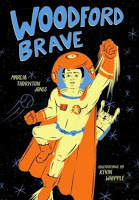 May Theme: WOODFORD BRAVEBy Marcia Thornton Jones
May Theme: WOODFORD BRAVEBy Marcia Thornton JonesThere are some stories that mean more than others. For me, that story is WODODFORD BRAVE. Why? Because of my mother.
When I needed first-hand information for Cory Woodford’s coming-of-age story set during WWII, I turned to my mother, Thelma Kuhljuergen Thornton. At the time, I had no idea how my mother’s stories would continue to resonate long after the writing of WOODFORD BRAVE was done. But now, as I read through the ARC, I am struck with how vivid my memories are of sitting in Mom’s den and listening to her talk about living and loving during World War II.
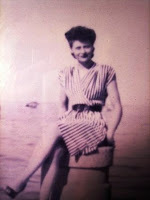 So while I read about how my main character, Cory, struggles with what it means to be a hero like his father who is fighting in the war, I remember Mom reminiscing about when she was a telephone operator and how on the day the Japanese bombed Pearl Harbor all the switchboards lit up at once; how all the operators knew something big had happened…they just didn’t realize how big it was at the time.
So while I read about how my main character, Cory, struggles with what it means to be a hero like his father who is fighting in the war, I remember Mom reminiscing about when she was a telephone operator and how on the day the Japanese bombed Pearl Harbor all the switchboards lit up at once; how all the operators knew something big had happened…they just didn’t realize how big it was at the time.And as Cory searches for rubber tires to complete a go-cart in order to compete in a backyard competition, I’m remembering Mom telling how rationing was an inconvenience; that they all just lived with it because they had to…but that what was worse for herself and all her friends was the fact that the boys were gone to war and there was no one to date!
When Cory tries to convince his friends that it’s up to them to keep their town safe from a Nazi spy, I’m remembering Mom telling me how my uncle spoke at a Main Street rally to encourage people to support the war effort by buying bonds.
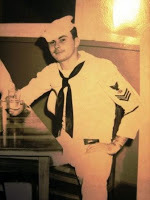 And when Cory and his friends go on a spy mission of their own and end up at the Veterans of Foreign Wars where girls dance with soldiers, I’m remembering Mom telling me about meeting a sailor who was home on leave because his ship had been torpedoed. A handsome man with deep-brown eyes. A sailor whose name was Robert Edwin Thornton.
And when Cory and his friends go on a spy mission of their own and end up at the Veterans of Foreign Wars where girls dance with soldiers, I’m remembering Mom telling me about meeting a sailor who was home on leave because his ship had been torpedoed. A handsome man with deep-brown eyes. A sailor whose name was Robert Edwin Thornton.WOODFORD BRAVE is not my mother’s story; it’s pure fiction. But weaving my mother’s experiences and memories through the pages of Cory’s story challenged me as both a writer and as a daughter because I wanted to get it right. For Cory.
And for my mother. Who just happens to be my best friend.
Happy Mother’s Day!
Published on May 10, 2015 05:03
May 8, 2015
Do I have permission?
My daughter is an amazing writer. Her characters jump off the page. She's brilliant at illuminating painful moments. But my daughter doesn't write anymore. When I asked her why, she said that plenty of people have already written whatever a privileged college student would say. She said the world needs to hear from different voices now. I couldn't argue with her. In fact, I had to ask myself--should I feel the same way?
Last year I was thrilled to be asked to write a fictional version of Mary Jemison's life--a young girl who was captured during the French and Indian War. Mary was adopted by two Seneca sisters, to replace their brother who had been killed by the colonists. Mary remained with the tribe for the next 65 years, even though she could have returned to her own kind.
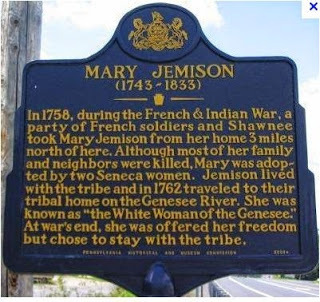 Historical plaque in Adams County, Pennsylvania
Historical plaque in Adams County, Pennsylvania
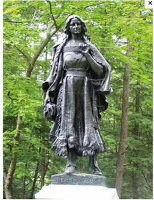 Mary Jemison statue
Mary Jemison statue
at Letchworth State Park
in New York
I loved learning about Mary and the Seneca, but the more I discovered, the less qualified I felt to write the story. How dare I, a middle-aged white woman, write with any authority on the Seneca? True, I had "permission" from the editor who hired me. True, modern Seneca are vastly different from those who lived in the 18th century. True, Mary wasn't a Native American either. But I knew someone who was would write a different story.
I did my best to be respectful to the Native American culture. But I'm still troubled by the problem of authenticity.
I know full well that too many voices have been excluded from the conversation for far too long. They must be encouraged. We need to learn from their lives. And yet, I don't want to tell versions of my own story over and over. Are we only allowed to write about our own experiences?
In the end, I gave myself permission to speak for Mary. I'm proud of my book--particularly the sections where Mary struggles to assimilate into an unfamiliar culture!
Ultimately I believe the answer is always to encourage more reading, more books, and more writing by more kinds of people---including ones like me who became writers in order to learn about new people and new worlds.
Last year I was thrilled to be asked to write a fictional version of Mary Jemison's life--a young girl who was captured during the French and Indian War. Mary was adopted by two Seneca sisters, to replace their brother who had been killed by the colonists. Mary remained with the tribe for the next 65 years, even though she could have returned to her own kind.
 Historical plaque in Adams County, Pennsylvania
Historical plaque in Adams County, Pennsylvania Mary Jemison statue
Mary Jemison statue at Letchworth State Park
in New York
I loved learning about Mary and the Seneca, but the more I discovered, the less qualified I felt to write the story. How dare I, a middle-aged white woman, write with any authority on the Seneca? True, I had "permission" from the editor who hired me. True, modern Seneca are vastly different from those who lived in the 18th century. True, Mary wasn't a Native American either. But I knew someone who was would write a different story.
I did my best to be respectful to the Native American culture. But I'm still troubled by the problem of authenticity.
I know full well that too many voices have been excluded from the conversation for far too long. They must be encouraged. We need to learn from their lives. And yet, I don't want to tell versions of my own story over and over. Are we only allowed to write about our own experiences?
In the end, I gave myself permission to speak for Mary. I'm proud of my book--particularly the sections where Mary struggles to assimilate into an unfamiliar culture!
Ultimately I believe the answer is always to encourage more reading, more books, and more writing by more kinds of people---including ones like me who became writers in order to learn about new people and new worlds.
Published on May 08, 2015 04:00
May 6, 2015
May Theme - Permissions by Deborah Lytton
How often do we give ourselves permission to make mistakes? But that's exactly what our best writing demands. I am a perfectionist by nature. I was a good student in school because I followed the rules, turned in my assignments on time and was always prepared for my tests. But writing doesn't ask us to follow the rules. Yes, we need to meet our revision deadlines and be prepared for discussions with agents and editors, and if we are lucky enough, promotion on our books. But all that comes later--after we've written the best book we can write. Maybe I love writing so much because when I write, I give myself permission to take chances. To try fitting words together that don't make sense or to write a character no one will never like but somehow make him loveable. I give myself permission to write poetry through my characters even though in real life, I would be hesitant to try writing poetry. Sometimes, I write entire sections of a book and the next day realize not one word actually works. But somehow, through the process of writing those non-working words, I find the ones that make the entire story come to life. I am raising my daughters to accept their mistakes in life because through those mistakes, they will learn who they are. Can't the same reasoning apply to our work? In our writing, we can find our voices through making mistakes, because sometimes, that one mistake may be your best writing of all.
Published on May 06, 2015 17:21
May 5, 2015
Paying it Forward Giveaway by Tracy Holczer
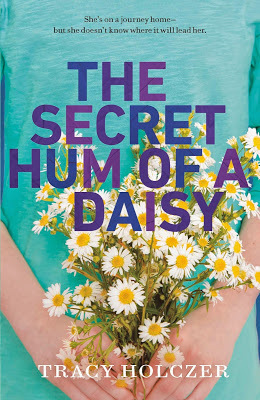 It's a new cover!It's paperback release day!! And in celebration of what the kidlit universe has given me over the last year, I'd like to return the gesture, so I'm going to give away some stuff. And because I am pushing the last few miles in the marathon that has been Book 2, I need some inspiration to carry me over the finish line!! Write your favorite inspirational quote in the comments section and you will be entered to win:
It's a new cover!It's paperback release day!! And in celebration of what the kidlit universe has given me over the last year, I'd like to return the gesture, so I'm going to give away some stuff. And because I am pushing the last few miles in the marathon that has been Book 2, I need some inspiration to carry me over the finish line!! Write your favorite inspirational quote in the comments section and you will be entered to win:1. Any book of your choice (really, any book. go crazy) and a paperback copy of The Secret Hum of a Daisy.
OR
2. Any book of your choice, a paperback copy of The Secret Hum of a Daisy AND a critique of the first three chapters of your middle grade novel or query letter.
OR
3. Any book of your choice, a paperback copy of The Secret Hum of a Daisy AND a free Skype visit with moi for your book club/students/poker night/whathaveyou.
And here is my quote for youse (and me):
"Confidence is a choice. It isn’t a feeling that will come along one day, after you’ve accomplished stuff, and knock you in the head. It’s about making a decision to change your behavior and then making that decision over and over and over again for the rest of your life or until you don’t have to think about it anymore."--Toni McGee Causey
Published on May 05, 2015 01:00
May 4, 2015
Megan: What Would Judy Do?
There are a lot of unwritten (sometimes unspoken) rules when writing for children. Lately one of the most pernicious is that if you want your book to have "universal" appeal, it should be about boys, or at least feature a significant boy character. And forget anything girly. Princesses, no way. Pink cover, that's out, too, if you want to reach both boys and girls.
At least that's the conventional wisdom.
So over a year ago when I found myself sitting in the library writing a scene about Ruth, the main character of what would become The Friendship Riddle, going on a mortifying bra shopping trip with her mother, I didn't think it would stay in. I was working at a middle school at the time and trying to write the most honest version of 6th grade that I could. Bras and who needs them or doesn't had already received some attention in the story, but I figured that's where it would end. The bra-shopping scence felt almost like an exercise, which was very freeing.
But then the scene turned out really well. Not only was it honest, but it also moved the plot forward and deepened the characterization. That question of universality was knocking around in my head, especially since the rest of the cast of chracters was made up mostly of boys. As I considered whether to keep or cut, I asked myself, "What would Judy Blume do?" thinking of how my fifth grade friends and I passed around Are You There God, It's Me Margaret. That novel was honest about our changing bodies in a way that we could find no where else. So I kept the scene. Maybe it will make boys uncomfortable. But I think to make that assumption doesn't give boys much credit.
I used to run a middle book club with mostly boy members. One of our books was Small Persons With Wings by Ellen Booraem. It's a book about fairies. There's some boy-girl stuff. And some girl puberty stuff. The cover has sparkles. The boys didn't bat an eye. They read the book and discussed it with the same enthusiasm of all our other titles.
No one book is for every reader, but dictating your writing based on broad assumptions about boys, girls, and "universality" is a recipe for stale writing. Instead, try asking, "What would Judy do?" and follow her lead to honest and authentic writing.
P.S. The Friendship Riddle is out tomorrow and you can see for yourself how it all turned out.
At least that's the conventional wisdom.
So over a year ago when I found myself sitting in the library writing a scene about Ruth, the main character of what would become The Friendship Riddle, going on a mortifying bra shopping trip with her mother, I didn't think it would stay in. I was working at a middle school at the time and trying to write the most honest version of 6th grade that I could. Bras and who needs them or doesn't had already received some attention in the story, but I figured that's where it would end. The bra-shopping scence felt almost like an exercise, which was very freeing.
But then the scene turned out really well. Not only was it honest, but it also moved the plot forward and deepened the characterization. That question of universality was knocking around in my head, especially since the rest of the cast of chracters was made up mostly of boys. As I considered whether to keep or cut, I asked myself, "What would Judy Blume do?" thinking of how my fifth grade friends and I passed around Are You There God, It's Me Margaret. That novel was honest about our changing bodies in a way that we could find no where else. So I kept the scene. Maybe it will make boys uncomfortable. But I think to make that assumption doesn't give boys much credit.
I used to run a middle book club with mostly boy members. One of our books was Small Persons With Wings by Ellen Booraem. It's a book about fairies. There's some boy-girl stuff. And some girl puberty stuff. The cover has sparkles. The boys didn't bat an eye. They read the book and discussed it with the same enthusiasm of all our other titles.
No one book is for every reader, but dictating your writing based on broad assumptions about boys, girls, and "universality" is a recipe for stale writing. Instead, try asking, "What would Judy do?" and follow her lead to honest and authentic writing.
P.S. The Friendship Riddle is out tomorrow and you can see for yourself how it all turned out.
Published on May 04, 2015 09:13
May 3, 2015
With Thanks to Kathleen Duey
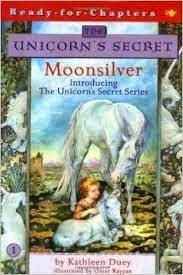 At my very first SCBWI conference (2006) I sat at in a high school classroom with other writers in a circle of desks around a new-to-me author Kathleen Duey. She was talking about her series The Unicorn's Secret, and then she was talking about writing in general, and suddenly I was sitting there with tears streaming down my cheeks.
At my very first SCBWI conference (2006) I sat at in a high school classroom with other writers in a circle of desks around a new-to-me author Kathleen Duey. She was talking about her series The Unicorn's Secret, and then she was talking about writing in general, and suddenly I was sitting there with tears streaming down my cheeks.I don't remember what she said exactly. I have no notes in my notebook, only tearstains. But I suspect, looking back, what she was giving me was PERMISSION. Permission to write, permission to be me, permission to write the stories in my heart.
Which is why, all these years later I still attend conferences, sometimes as an attendee, sometimes as an instructor. Each one of us needs that moment of permission, over and over again. Ultimately, it's a gift we give ourselves.

Published on May 03, 2015 03:30
May 2, 2015
May Theme: Permissions By Ann Haywood Leal

When I was in sixth grade and I finished writing my novel on one hundred pages of pastel-colored notebook paper, my mom read it cover to cover, joyfully. I watched her eagerly from off to the side, drinking in every smile and soft laugh as she turned the pages. Her reviews were always like a starred Kirkus. "What are you going to write next?" she always asked.
My fragile sixth grade self was all pumped up with pride, so of course I wanted to tell my best friend about my new novel. What would an eleven-year-old book nerd do? Write to Judy Blume, of course. Mom helped me find her publisher's address and didn't crack one smile when I told Judy Blume I was interested in having my novel published. Then Mom celebrated right along with me when Judy wrote back (twice!) with her gracious writerly and motherly advice.
When I decided to send my book out to E.P. Dutton, Judy Blume's publisher, Mom didn't even bat an eye. She just helped me find the address. Then she commiserated with me when I got the rejection postcard.
Fast forward to my adulthood when I had moved on from colored notebook paper, and was sending my book out on actual double-spaced computer paper. Mom was still eagerly reading my work. Not a phone call or a visit went by without her asking, "Have you heard yet? Keep writing. A publisher is sure to take it soon." Meanwhile, the rejections were piling up.
Mom got sick and passed away very suddenly without ever being able to hold one of my books in her hand.
But on that day when a publisher finally said yes, I knew she was up in heaven saying, What's your next book going to be about?
Published on May 02, 2015 04:07
April 29, 2015
April Theme: Gurfu is Enough by Jen Cervantes
 Stories grow, the magician told the gardener. If we give them water and light.The gardener knew this to be true. But she remembered someone from long ago who said, It had been startling and disappointing to me to find out that story books had been written by people, that books were not natural wonders, coming up of themselves like grass."I want to believe such wonder exists," the gardener told the magician. "That stories (the ones demanding to be told) indeed come up like the grass."Then after a long pause, the gardener asked, "How much light?"As much as you can hold in your heart."And how much water?"The magician smiled. Enough."But how do I know how much is enough?"Gurfu. Seeing the gardener's confusion, the magician added, It's an ancient word, from an ancient culture."What does it mean?" The amount of water that can be held in one hand.
Stories grow, the magician told the gardener. If we give them water and light.The gardener knew this to be true. But she remembered someone from long ago who said, It had been startling and disappointing to me to find out that story books had been written by people, that books were not natural wonders, coming up of themselves like grass."I want to believe such wonder exists," the gardener told the magician. "That stories (the ones demanding to be told) indeed come up like the grass."Then after a long pause, the gardener asked, "How much light?"As much as you can hold in your heart."And how much water?"The magician smiled. Enough."But how do I know how much is enough?"Gurfu. Seeing the gardener's confusion, the magician added, It's an ancient word, from an ancient culture."What does it mean?" The amount of water that can be held in one hand.
Published on April 29, 2015 13:28
April 26, 2015
April Theme: Reading to Write by Olugbemisola Rhuday-Perkovich
Recently, while I was teaching a class, I decided that I wouldn't be able to work on my WIPs while the course was going on. So, along with some freelance assignments, mostly, I read. And read.
And it was glorious! I read old favourites and new releases. I read genres that I don't often read. I inhaled books that had been sitting on my shelves for years, and some, after a few chapters, were set out on the sidewalk to wait for a more suitable reader. (In this neighborhood, free books don't sit for long.)
Now, I'm between teaching and digging back into WIPs--picture books, novels, fiction and nonfiction--and I realize:
I was working on my WIPs all along.
I can't forget that reading opens up creative waterways that expands my thinking, encourages me to innovate and take risks--it makes my writing better.
And books are just so, so good I KNOW RIGHT?!!?!
And it was glorious! I read old favourites and new releases. I read genres that I don't often read. I inhaled books that had been sitting on my shelves for years, and some, after a few chapters, were set out on the sidewalk to wait for a more suitable reader. (In this neighborhood, free books don't sit for long.)
Now, I'm between teaching and digging back into WIPs--picture books, novels, fiction and nonfiction--and I realize:
I was working on my WIPs all along.
I can't forget that reading opens up creative waterways that expands my thinking, encourages me to innovate and take risks--it makes my writing better.
And books are just so, so good I KNOW RIGHT?!!?!
Published on April 26, 2015 12:39
April 25, 2015
CELEBRATING MY INNER FOOL
The first time you do anything, you look like an idiot. No first kiss ever didn't involve a nose-bump. No first-time driver ever shifted gears perfectly. No writer will ever tell you their first novel was BEAUTIFUL (most of the time, they’re in a shelf somewhere collecting dust).
Here’s the thing, though: the first draft of every book makes me feel like a fool. Doesn’t matter how many books I’ve written and published. The first draft always makes me feel like I’m fifteen again, behind the wheel for the first time.
Right now, I’m revising my next YA for HarperCollins. As I read my editor’s comments, do I see some wrong turns I made the first time around? You bet. I’ve got a better grip on the wheel, a better sense of where I am in the lane, and I feel great about where I’m headed. I'm working my way toward a book I'm 100% proud of.
...All thanks to the fact that I was willing to look a little foolish the first time around...
Here’s the thing, though: the first draft of every book makes me feel like a fool. Doesn’t matter how many books I’ve written and published. The first draft always makes me feel like I’m fifteen again, behind the wheel for the first time.
Right now, I’m revising my next YA for HarperCollins. As I read my editor’s comments, do I see some wrong turns I made the first time around? You bet. I’ve got a better grip on the wheel, a better sense of where I am in the lane, and I feel great about where I’m headed. I'm working my way toward a book I'm 100% proud of.
...All thanks to the fact that I was willing to look a little foolish the first time around...
Published on April 25, 2015 05:00



